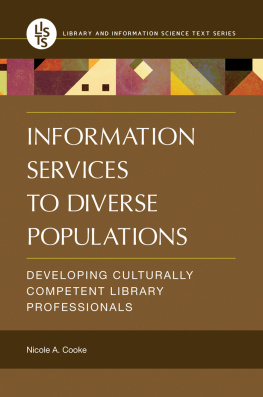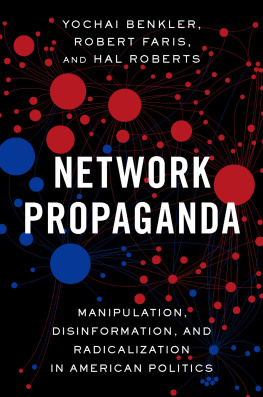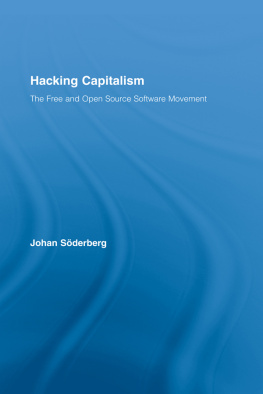The Wealth of Networks - How Social Production Transforms Markets and Freedom
Yochai Benkler
The Wealth of Networks - How Social Production Transforms Markets and Freedom,
Yochai Benkler
Part One - The Networked Information Economy
Part Two - The Political Economy of Property and Commons
Part Three - Policies of Freedom at a Moment of Transformation
Endnotes
Index
Metadata
Manifest
Rights: Copyright 2006 Yochai Benkler.;
License: All rights reserved. Subject to the exception immediately following, this book may not be reproduced, in whole or in part, including illustrations, in any form (beyond that copying permitted by Sections 107 and 108 of the U.S. Copyright Law and except by reviewers for the public press), without written permission from the publishers. http://creativecommons.org/licenses/by-nc-sa/2.5/ The author has made an online version of the book available under a Creative Commons Noncommercial Sharealike license; it can be accessed through the author's website at http://www.benkler.org.
The Wealth of Networks - How Social Production Transforms Markets and Freedom,
Yochai Benkler
Attribution
For Deb, Noam, and Ari
"Human nature is not a machine to be built after a model, and set to do exactly the work prescribed for it, but a tree, which requires to grow and develop itself on all sides, according to the tendency of the inward forces which make it a living thing." "Such are the differences among human beings in their sources of pleasure, their susceptibilities of pain, and the operation on them of different physical and moral agencies, that unless there is a corresponding diversity in their modes of life, they neither obtain their fair share of happiness, nor grow up to the mental, moral, and aesthetic stature of which their nature is capable."
John Stuart Mill, On Liberty (1859)
The Wealth of Networks - How Social Production Transforms Markets and Freedom,
Yochai Benkler
Acknowledgments
Reading this manuscript was an act of heroic generosity. I owe my gratitude to those who did and who therefore helped me to avoid at least some of the errors that I would have made without their assistance. Bruce Ackerman spent countless hours listening, and reading and challenging both this book and its precursor bits and pieces since 2001. I owe much of its present conception and form to his friendship. Jack Balkin not only read the manuscript, but in an act of great generosity taught it to his seminar, imposed it on the fellows of Yale's Information Society Project, and then spent hours with me working through the limitations and pitfalls they found. Marvin Ammori, Ady Barkan, Elazar Barkan, Becky Bolin, Eszter Hargittai, Niva Elkin Koren, Amy Kapczynski, Eddan Katz, Zac Katz, Nimrod Koslovski, Orly Lobel, Katherine McDaniel, and Siva Vaidhyanathan all read the manuscript and provided valuable thoughts and insights. Michael O'Malley from Yale University Press deserves special thanks for helping me decide to write the book that I really wanted to write, not something else, and then stay the course. [pg 10]
This book has been more than a decade in the making. Its roots go back to 1993-1994: long nights of conversations, as only graduate students can have, with Niva Elkin Koren about democracy in cyberspace; a series of formative conversations with Mitch Kapor; a couple of madly imaginative sessions with Charlie Nesson; and a moment of true understanding with Eben Moglen. Equally central from around that time, but at an angle, were a paper under Terry Fisher's guidance on nineteenth-century homesteading and the radical republicans, and a series of classes and papers with Frank Michelman, Duncan Kennedy, Mort Horwitz, Roberto Unger, and the late David Charny, which led me to think quite fundamentally about the role of property and economic organization in the construction of human freedom. It was Frank Michelman who taught me that the hard trick was to do so as a liberal.
Since then, I have been fortunate in many and diverse intellectual friendships and encounters, from people in different fields and foci, who shed light on various aspects of this project. I met Larry Lessig for (almost) the first time in 1998. By the end of a two-hour conversation, we had formed a friendship and intellectual conversation that has been central to my work ever since. He has, over the past few years, played a pivotal role in changing the public understanding of control, freedom, and creativity in the digital environment. Over the course of these years, I spent many hours learning from Jamie Boyle, Terry Fisher, and Eben Moglen. In different ways and styles, each of them has had significant influence on my work. There was a moment, sometime between the conference Boyle organized at Yale in 1999 and the one he organized at Duke in 2001, when a range of people who had been doing similar things, pushing against the wind with varying degrees of interconnection, seemed to cohere into a single intellectual movement, centered on the importance of the commons to information production and creativity generally, and to the digitally networked environment in particular. In various contexts, both before this period and since, I have learned much from Julie Cohen, Becky Eisenberg, Bernt Hugenholtz, David Johnson, David Lange, Jessica Litman, Neil Netanel, Helen Nissenbaum, Peggy Radin, Arti Rai, David Post, Jerry Reichman, Pam Samuelson, Jon Zittrain, and Diane Zimmerman. One of the great pleasures of this field is the time I have been able to spend with technologists, economists, sociologists, and others who don't quite fit into any of these categories. Many have been very patient with me and taught me much. In particular, I owe thanks to Sam Bowles, Dave Clark, Dewayne Hendricks, Richard Jefferson, Natalie Jeremijenko, Tara Lemmey, Josh Lerner, Andy Lippman, David Reed, Chuck Sabel, Jerry Saltzer, Tim Shepard, Clay Shirky, and Eric von Hippel. In constitutional law and political theory, I benefited early and consistently from the insights of Ed Baker, with whom I spent many hours puzzling through practically every problem of political theory that I tackle in this book; Chris Eisgruber, Dick Fallon, Larry Kramer, Burt Neuborne, Larry Sager, and Kathleen Sullivan all helped in constructing various components of the argument.





